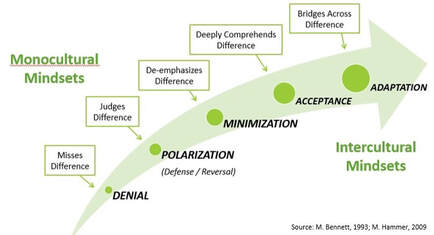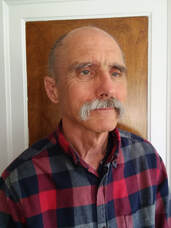 Ray Wiedmeyer, On Behalf of the Beloved Community Communications Team The Intercultural Development Inventory (IDI, https://idiinventory.com), developed by Mitchell R. Hammer, professor of international peace and conflict resolution at American University, assesses intercultural competence as the capability to shift cultural perspective and appropriately adapt behavior to cultural differences and commonalities. To help us grow our ability to be an anti-racist, multicultural spiritual community, a number of key ministry groups at Unity Church are being invited to take the IDI. As part of a series of articles about the IDI, Ray Wiedmeyer, a member of the Beloved Community Communications Team, shares what he learned from the IDI and how he determined to increase his cultural competency. If you are interested in taking the IDI, please email Drew Danielson at [email protected]. Back in the early 1970s, I spent a semester abroad in Malaysia as a college student. Classes consisted of Malay language study, Eastern Religions, a hands-on Asian Textile course, Psychology of Adjustment and included a month of travel in Japan, Thailand, and Taiwan. That semester of college was one of the most exciting of my whole college education. I was suddenly immersed in a world that was totally different from my world back in America. Everything from food, to housing, to government, to religion was totally “not” the culture I had grown up in or was used to. My return home months later was filled with culture shock. I suddenly saw things in my environment that I had never really seen before. In 2016 I took the IDI (Intercultural Development Inventory) for the first time at Unity Church as part of the Mid-America Mosaic Makers Conference. Prior to taking it, I would have told you that I thought I was a pretty culturally well-rounded person. After all, not only had I traveled world-wide in the years since college, but I also had friends and acquaintances from a variety of cultures. It was a surprise then when the IDI rated my intercultural skills as firmly in the center of the Intercultural Development Continuum, also known as Minimization. It left me in a bit of a quandary. What was I missing? The competency they spoke of was something I wished I had. I saw it as a necessity if we really want a world where everyone is treated as an equal and true justice is achieved. Our Unitarian principles are just words if I’m not working on a becoming a better me; a person moving in the world in such a way as to not ignore or negate others. After taking the IDI the first time, I set up a one-on-one conversation with a qualified administrator. We went over those first results and she suggested some activities I might work on. One of those activities, I remember, was keeping an intercultural journal. This was a place where I “might reflect on cultural differences and commonalities I observe in my daily interactions with people from other cultural groups.” I remember doing this for several months and feeling more and more aware of those interactions as they came up. I also continued to volunteer at Mano a Mano, where work activities here in the U.S. and my occasional trips down to Bolivia gave me frequent real-life practice interacting with that culture. I began to look for, and engage more fully in, the cross-cultural friendships I already had. I took part in events sponsored by Unity Church where I was immersed in the discussion of white privilege. I began to read more about American racial history and I traveled to Africa to learn more about slavery. I found myself becoming more and more conscious of the white culture I was constantly swimming in and how it kept me from seeing and acknowledging that there were other ways of seeing the world. And last but not least, I worked on staying present when my cultural view of the world was being questioned or challenged. Recently, I took the IDI again. I believe it was the third time and I was glad to see that I had made some measurable progress. I believe it was what I had been working on the past four to five years that had moved me on the continuum, hopefully making me more competent in my interactions with other cultures. Yes, I’ve made progress but I’ve also become aware of how much I still need to learn, so I am not about to end this life-long journey anytime soon.
0 Comments
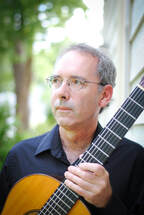 Pauline Eichten on behalf of the Beloved Community Staff Team The Intercultural Development Inventory, developed by Mitchell R. Hammer, professor of international peace and conflict resolution at American University, assesses intercultural competence as the capability to shift cultural perspective and appropriately adapt behavior to cultural differences and commonalities. To help us grow our ability to be an anti-racist, multicultural spiritual community, a number of key ministry groups at Unity Church are being invited to take the IDI. The sessions are also available to individual congregants. In the March issue of commUNITY (and the last blog post here at the BCST page), Peter Heege talked with Kelley Nelson, one of our three qualified IDI administrators, about the role of the administrators. This month we asked Unity Church member Nick Raths about his experience with the IDI. When he walked into the Welcome Team group profile feedback session, Unity Church member Nick Raths didn’t know anything about the Intercultural Development Inventory (IDI). When he left, he thought “this IDI thing is really important!” Betsy Hearn, one of our qualified IDI administrators, talked with me about the Welcome Team session. The group started with a discussion about culture: what do we mean by it, and what do we know about our own culture. The facilitators used the iceberg metaphor, which says the majority of what makes up culture is “hidden,” to explore what cultural differences might look like. Then they reviewed the IDI continuum and the different stages of development. It was the first time Nick had seen the IDI continuum. “It made sense,” he said. “I could see myself at different times in my life. The group profile was then explained. This profile shows a distribution of where each individual locates on the continuum, but not any individual result. Those are only shared with a qualified IDI administrator. According to Betsy, this Welcome Team group had a typical profile. Sixty-four percent of the group ended up in the center, in minimization, similar to results of groups around the world. Minimization highlights the commonalities in basic human needs and values and de-emphasizes the differences. This can impede recognition or appreciation of deeper cultural differences.
Members of the Welcome Team group had what she described as a “healthy conversation” about the practice of welcoming. How have we learned to do it, and is that how someone else might want to be welcomed? What is the role of the Welcome Team? Betsy commented on how multi-layered the role can be, from greeting people at the door, to managing the flow in and out of the sanctuary, to helping people find their way around the building. As Nick and I talked, he shared his realization that he needs to be more conscious of his own lens, to reflect more in the moment: What am I thinking? How is that affecting my behavior? I asked him how he thought the IDI might affect his ministry. “I never thought of being on a Welcome Team as a ministry,” he said, but he sees how Welcome Teams can set the tone for how people experience Unity Church. Unity Church has a culture that some might take for granted and find quite comfortable, but may not feel welcoming to some others. The IDI offers an opportunity to become more aware of how each of us experiences cultural difference. The one-on-one feedback session provides the greatest potential value. It can offer a roadmap to help a person further develop their self-awareness and ability to facilitate learning across cultures. Nick is looking forward to his one-on-one feedback and is eager to learn more about what he can do to grow. Betsy emphasized that there is no right or wrong with the IDI; it is simply a benchmark to grow from. The individual IDI profile and the one-on-one feedback sessions will help each of us grow in self-awareness and intercultural competence. And that will help us fulfill Unity Church’s stated Ends of building an anti-racist, multicultural Beloved Community. There’s no charge for the IDI and the individual sessions, although donations to cover the cost are accepted. Anyone interested is encouraged to get on the schedule by contacting Drew Danielson at [email protected] to sign-up. By Peter Heege The Intercultural Development Inventory (IDI), developed by Mitchell R. Hammer, professor of international peace and conflict resolution at American University, assesses intercultural competence as the capability to shift cultural perspective and appropriately adapt behavior to cultural differences and commonalities. To help us grow our ability to be an anti-racist, multicultural spiritual community, a number of key ministry groups at Unity Church are being invited to take the IDI. The sessions are also available to individual congregants. In the February issue of commUNITY, Mary Pickard discussed how Unity hopes to use the IDI. This article expands on that with an introduction to our three IDI qualified administrators and the role they will play. Our Qualified IDI Administrators 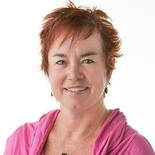 Betsy Hearn is a lifelong learner who actively pursues opportunities to grow as a human. She is a learning and development professional with experience across the non-profit, higher education and corporate worlds. She has worked in leadership development, organizational development and diversity and inclusion for the past thirty years. She has been an IDI qualified administrator since 2017 and has facilitated workshops, debriefs and coaching for individuals to understand the benefit from the Intercultural Development Inventory (IDI). 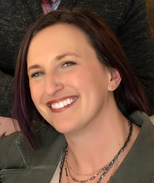 My name is Kelley Nelson and I am a member of Unity Church and qualified IDI administrator. I am excited to offer you the opportunity to take the IDI assessment and receive feedback from me over the next few months as we work together to become even more effective in our cross-cultural work. Here is a little bit about myself: Kelley Winchester Nelson has spent her career advocating for educational equity and developing cultural competency in a myriad of settings and diverse circumstances. Upon graduating Cum Laude from Colby College with a BA in Sociology and a minor in Women's Studies, Kelley spent seven years with The Steppingstone Foundation in Boston recruiting, preparing and supporting youth from under-resourced communities as they applied to and matriculated from top independent schools in the area. Kelley served as a teacher, advocate, and cultural broker working with families to identify their educational goals and finding the right match in academically rigorous, though predominantly white and upper class, private schools, while simultaneously challenging those schools to change their cultures and environment to be truly diverse and welcoming spaces. When her family relocated to the Twin Cities, Kelley joined The Blake School's lead administrative team as the Co-Director of the Center for Diversity creating change from within at a prestigious independent school. It was there that in 2006, Kelley became a qualified Intercultural Development Inventory administrator and became a student of the developmental model of intercultural sensitivity. Kelley has since applied her knowledge and expertise in the development of cultural competency coupled with a deep understanding of white privilege, power, and oppression, in work with teachers and students in St. Paul Public Schools, the East Metro Integration District, and currently in her roles with several youth development programs in the Twin Cities. 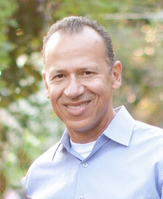 Tim Wendt is an experienced HR professional with experience working with executive leaders in the corporate environment. He helped to lead executives at a Fortune 500 company through a cultural competence journey that led to the organization developing a cultural competence and DEI roadmap. With more than 30 years of human resources experience he brings both breadth and depth to corporate and DEI initiatives. He is an IDI qualified administrator and has facilitated hundreds of workshops for thousands of employees. Interview with Kelley Nelson
PH: What’s your take on the IDI in general and its potential benefits for Unity Church? KN: I’ve been working with the IDI for 15 years. It’s an extremely useful tool for people to understand how they make sense of cultural difference based upon their life experiences. It encourages a wider definition of culture and is a roadmap for developing that wider view. It helps people understand how the experiences they have had during their lives influence how they interact with other cultures. Once people understand themselves better it enables more effective interaction with other cultures. Our Ends statements call on us to develop a more multicultural, multiracial congregation. Unity’s population has historically (and currently) been very homogeneous, and realistically our outreach efforts have been based on our own perspectives and have not been terrifically successful in attracting people with a wider variety of backgrounds and perspectives. When groups and individuals become more effective in interactions, the congregation can be more effective in attracting the diverse population we strive for. PH: What results have you seen with other organizations you’ve worked with? KN: I’ve primarily worked in the education area. There were many “aha” moments in those trainings, unearthing embedded ideas and stories that negatively affect cultural competence. Individual sessions were very effective, and when there was a committed and cohesive group that was guided by the learnings from these sessions, the organization attracted and retained a diverse culture. PH: Tell us about a group profile feedback session. KN: A group session, usually about 1-1/2 hours, typically includes a quick review of the concepts of culture (iceberg model) and a review of the stages on the IDI continuum from denial through minimization to acceptance/adaptation. A group profile is developed using the distribution on the development continuum of individual profiles of group members. After discussing the group result, and the variances in individual results, the group is coached on how to use these results to enable more effective group action. PH: What are the options for an individual feedback session and why would it be helpful? KN: Those participating in group feedback sessions will be offered the opportunity for individual feedback sessions on a pay-as-you-are-able basis, with scholarships available from Unity's Helener Currier Endowment. The individual sessions are approximately one hour and will include discussion of your individual experience, how it is tied to your IDI profile, and development of a plan for using this information to increase your effectiveness in multicultural work. These feedback sessions have been shown to be the single most effective way to facilitate growth along the IDI continuum and to promote meaningful participation in group work toward our Ends. These sessions are also available to individual congregants on the same basis, and those interested are strongly encouraged to schedule one for themselves. Contact Drew Danielson at [email protected] for more information or to sign-up. |
Topics
All
Beloved Community ResourcesUnity Justice Database
Team Dynamics House of Intersectionality Anti-Racism Resources in the Unity Libraries Collection Creative Writers of Color in Unity Libraries The History of Race Relations and Unity Church, 1850-2005 Archives
July 2024
Beloved Community Staff TeamThe Beloved Community Staff Team (BCST) strengthens and coordinates Unity’s antiracism and multicultural work, and provides opportunities for congregants and the church to grow into greater intercultural competency. We help the congregation ground itself in the understanding of antiracism and multiculturalism as a core part of faith formation. We support Unity’s efforts to expand our collective capacity to imagine and build the Beloved Community. Here, we share the stories of this journey — the struggles, the questions, and the collaborations — both at Unity and in the wider world.
The current members of the Beloved Community Staff Team include Rev. Kathleen Rolenz, Rev. KP Hong, Rev. Lara Cowtan, Drew Danielson, Laura Park, Lia Rivamonte and Angela Wilcox. |
